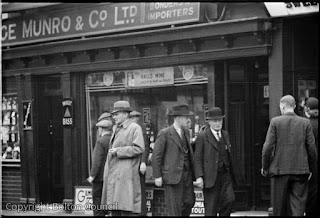The Bay Horse, Deansgate, pictured in 1937. The photograph was taken by Humphrey Spender for the Mass Observation project and is one of a number of images from that period at the Bolton Worktown website.
The history of the public house holds many examples of
licensed premises that kept the name of a significant figure in its history as
a name or a nickname. The Old Original British Queen on Blackburn Road was a
known as ‘Pomps’ after the family that owned the pub in the nineteenth century.
The Joiners Arms on Deansgate was always known as Bathe’s Vaults even after
Henry Bathe left, and a hundreds yards or so up Deansgate, the Bay Horse was
always known as ‘The Scotch Vaults’. [1]
By 1860, Munro was confident enough to go into business on
his own account. He founded the drinks wholesaling business of George Munro
& Co on Deansgate and branches were added in Blackburn, Wigan and Hanley
near Stoke-on-Trent. The latter was founded in partnership with John Munro, who is believed to have been George’s brother.
George Munro & Co bought the Bay Horse in 1865. This was one of
Bolton’s oldest pubs. It appears on the Great Bolton Alehouses in 1778 and was
in existence for some time prior to that.
According to the 1778 list the landlord was one Thomas
Middleton.The Sankey family were in control for a number of years at the start
of the 19th century. Enoch Sankey was licensee until his death at
the age of 45 in 1823. His wife Mary succeeded him until she died in 1830. John Eglin was in charge, according to the
1836 Bolton Directory. Eglin also ran the Flag on Great Moor Street. The 1843 directory lists William Green as
licensee and in 1853 it was Henry Dobson.
Given that the tied house system of pub ownership was some
years away it was obvious that licensees, much like today, were leasing the pub and
leaving after just a few years. Munro’s effectively tied the Bay Horse to their
wholesale drinks business giving them an outlet for the brands they dealt in.
As it was a public house with a full licence they could wines and spirits as
well as beer.
By 1871 Munro’s Bolton branch, based at the Bay Horse,
employed 10 men, two boys and one woman.
A fire in June 1879 at the back of the Bay Horse, where
Munro kept his goods, caused damage estimated at hundreds of pounds. Otherwise,
business was good. By 1881 the Munro family were living at Greenbank on Chorley
New Road, Heaton.
Like a number of prominent publicans Munro got involved in
politics and represented the Exchange ward for the Liberal Party on Bolton
Council from 1886 to 1889. A keen Presbyterian he was a member and generous
supporter of St Andrew’s Presbyterian church on Bowker’s Row. [3]
Munro married a Scottish lady, Isabella Waugh of Lochmaben,
Dumfries-shire and they had three sons and four daughters. He died in Bolton on
30 April 1894. Isabella died in Staffordshire in 1919 at the age of 81.
The Bay Horse continued until 1960. But right up to the end
of its life the premises always gave the impression that it was a bonded
warehouse rather than a pub as the 1937 photograph from the Humphrey Spender collection shows.
In the end the pub was sold to Marks and Spencer in 1959 and
after around 200 years of history last orders were called for the final time in
April 1960.
The site of the Bay Horse would form part of M&S’s new
Bolton store which was fully open by the summer of 1968.
Incidentally, another of Munro's pubs, the Freemason's on Market Street in Farnworth, is still known by the nickname 'Munro's'.
Incidentally, another of Munro's pubs, the Freemason's on Market Street in Farnworth, is still known by the nickname 'Munro's'.
[1] Bolton Pubs 1800-2000, by Gordon Readyhough. Published by Neil Richardson (2000).
[2] Waugh family archive.
[3] The church can be still be seen and was remodelled in
the seventies as a small shopping arcade known as St Andrew’s Court.




No comments:
Post a Comment